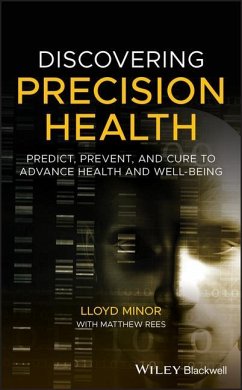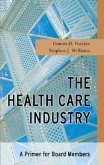Today we are on the brink of a much-needed transformative moment for health care. The U.S. health care system is designed to be reactive instead of preventive. The result is often delayed diagnoses, which contribute to health outcomes that fall short of what our high level of spending should deliver. Stanford Medicine has worked to remedy this by proposing a new vision for health and health care. In Discovering Precision Health, Stanford Medicine's dean, Lloyd Minor, and Matthew Rees describe a holistic approach that calls for keeping people healthy by preventing disease before it starts--and personalizing the treatment of individuals based on their specific profiles. This paradigm-shifting book also reveals how biomedical advances are dramatically improving our ability to treat and cure complex diseases, while emphasizing the need to devote more attention to social, behavioral, and environmental factors that are often the primary determinants of health. The book features descriptions of the pioneering work undertaken at Stanford Medicine as well as highlights of how tools from smartphone technology to genome sequencing to routine blood tests are helping avert illness and promote health. "Instead of trying to cure disease after the fact, Discovering Precision Health will empower anyone to win the race against illness before it begins. Lloyd Minor's bold new vision is of a world in which the latest innovations, discovery-based research, and revolutionary new thinking will forever change the way you and your doctor collaborate to maintain your health and well-being." --Arianna Huffington, founder and CEO of Thrive Global "If you're only going to read one book about the future of individual health and health care, this book is it. Discovering Precision Health showcases how technology and biomedical innovation are bringing greater precision to predicting, preventing, and curing disease." --Ann Lamont, venture capitalist and health care investor "Stanford Medicine's leadership in the movement toward Precision Health is one of the university's most promising contributions. In Discovering Precision Health, Lloyd Minor masterfully shows how this vision is already transforming health care, creating a new paradigm for health and well-being." --Marc Tessier-Lavigne, President, Stanford University "Much has been written about the need to have a health care system more focused on preventing disease, as well as the need to leverage recent technological advances in consumer-focused devices, digital technologies, data science, and artificial intelligence. What sets this book apart is its breadth and depth." - Health Affairs "This is an outstanding contribution to the world of medicine detailing an exciting way forward to change the thinking from medical care to maintaining health. It is provocative reading for all." - Doody's Review Service
Hinweis: Dieser Artikel kann nur an eine deutsche Lieferadresse ausgeliefert werden.
Hinweis: Dieser Artikel kann nur an eine deutsche Lieferadresse ausgeliefert werden.








